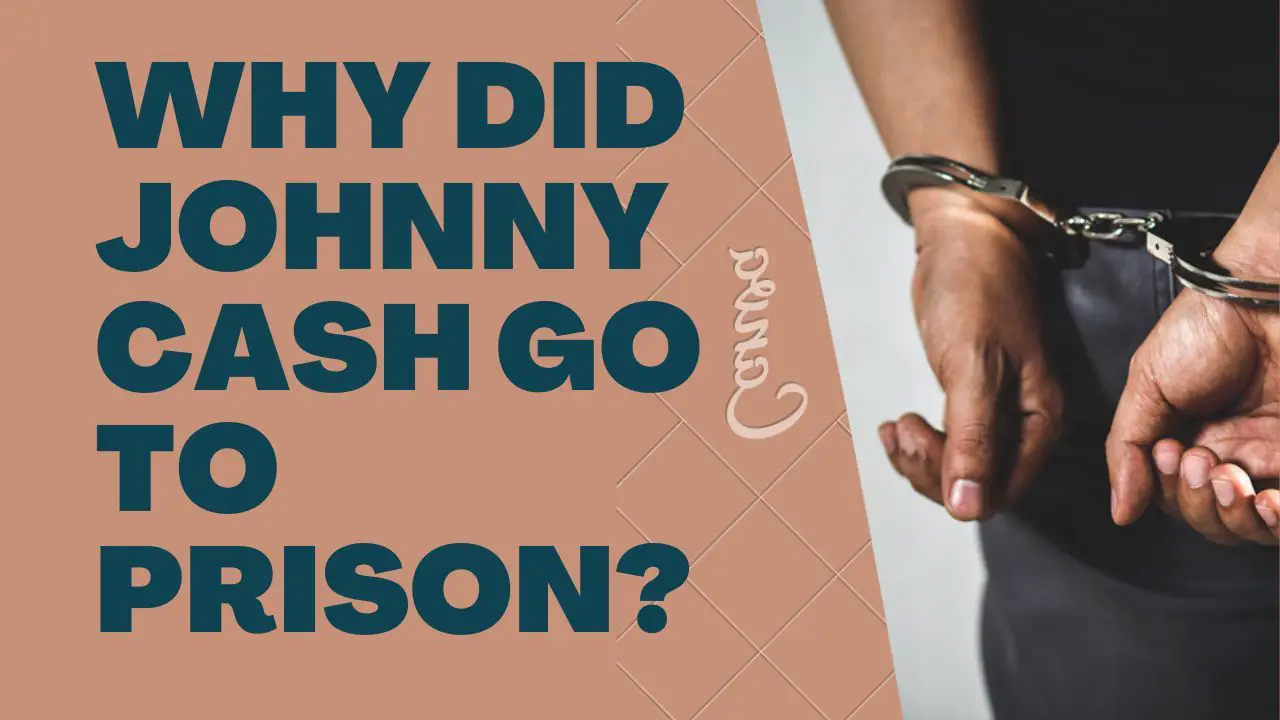Why Did Johnny Cash Go to Prison?
Why Did Johnny Cash Go to Prison? In this article, we have discussed everything you need to know about Johny Cash.

Johnny Cash is not a name unknown to most. Some would argue that he was the real king of country music. Even if that were not the case, he wouldn’t land too far off from that title. Much of his music contained sorrow, moral adversity, rebelliousness, and redemption themes, especially in the later stages of his musical career.
Another trademark of Cash’s was his free prison concerts. He gave his first such performance at Huntsville State Prison in Huntsville, Texas. Roused by the warm reception, Cash performed at a string of other prisons in the coming years before the legendary Folsom show in 1968, which later spawned the Folsom Prison album.
On New Year’s Day, 1958, Cash performed at the notorious San Quentin State Prison in Marin County, California.
However, this is not where his prison adventures end, as he was sent to jail not once but multiple times. As for why Johnny Cash went to prison, you can find the answers below.
Who was Johnny Cash?
Johnny Cash was born John R. Cash in Kingsland, Arkansas, on 26th February 1932.
His parents were Ray Cash and Carrie Cloveree (née Rivers) and had six siblings, three older ones, named Roy, Margaret Louise, and Jack, and three younger ones, named Reba, Joanne, and Tommy (who also became a successful country musician).
He was primarily of English and Scottish descent, though his grandparents also claimed Cherokee descent, disproven through a DNA test of Cash’s daughter Rosanne.
Cash's early life was dominated by gospel music and radio. His mother and a childhood friend taught him a guitar, and he began playing and writing songs at 12.
When young, Cash had a high-tenor voice before becoming a bass-baritone after his voice changed after puberty. In high school, he sang on a local radio station in Dyess, Arkansas.
Decades later, he released an album of traditional gospel songs from his childhood called My Mother's Hymn Book. He was also greatly influenced by traditional Irish music, which he heard performed weekly by Dennis Day (an American singer of Irish descent) on the Jack Benny radio program.
Military Service
Cash enlisted in the Air Force on 7th July 1950. He worked as a Morse code operator intercepting the Soviet Army transmissions. At Landsberg, he created his first band, "The Landsberg Barbarians."
On 3rd July 1954, he was honorably discharged as a staff sergeant, and thus he returned to Texas. During his military service, he acquired a distinctive scar on the right side of his jaw caused by surgery to remove a cyst.
Johnny Cash as a Musician
In 1955, Cash made his first recordings at Sun Records, including songs "Hey Porter" and "Cry! Cry! Cry!" released in late June and met with huge success on the country charts. Cash's next record, "Folsom Prison Blues," made the country's top five on the chart.
In 1958, Cash left Sun Records to sign a lucrative offer with Columbia Records. His single "Don't Take Your Guns to Town" became one of the biggest hits of his career, and he later recorded a collection of gospel songs for his second album for Columbia Records. Cash's career was handled by Saul Holiff, a London, Ontario-born Canadian music promoter. Their 13-year relationship was the subject of Saul's son's biopic My Father and the Man in Black.
The Man in Black
Early in his career, Cash was given the teasing nickname "the Undertaker" by fellow music artists because of his habit of wearing all-black clothes on stage. He said he chose to wear them because they were easier to keep looking clean on long tours. This also served to earn him the title of “The Man in Black.”
Drug Addiction
As his career took off massively in the late 1950s, Cash started drinking heavily and became addicted to uppers (amphetamines) and downers (barbiturates). For a brief time, he shared an apartment in Nashville, Tennessee, with Waylon Jennings (the pioneer of the Outlaw Movement in country music), who was deeply addicted to amphetamines.
Cash continued to use these stimulants to stay awake during tours. Friends joked about his worsening condition, including "nervousness," anxiety, and erratic behavior, many ignoring the warning signs of his aggravating drug addiction.
Although he was spiraling out of control in various ways, Cash could still deliver hits due to his hectic creativity.
Johnny Cash in Prison
Although Cash cultivated a romantic outlaw image, he never once served a prison sentence. Despite ending up in jail seven times for misdemeanors, he stayed only one night on each of his stays.
Why did Johnny Cash go to Prison?
From 1959 through 1968, before his rejuvenation with his second wife, June Carter, by his side, Cash was arrested multiple times for public drunkenness, reckless driving, and drug possession.
On 11th May 1965, he was arrested in Starkville in the Oktibbeha County of Mississippi for trespassing late at night onto private property to pick flowers, an incident he used to write the song "Starkville City Jail." He described this experience, saying he innocently picked dandelions and daisies when the sheriff pulled up and carted him to jail, where he had to spend the rest of the night and had to pay a $36 fine.
While on tour that very year, he was arrested on 4th October in El Paso, Texas, by a narcotics squad while crossing the border. The officers discovered 688 Dexedrine capsules (amphetamines) and 475 Equanil (antibiotics, sedatives, or tranquilizers) tablets that the singer hid inside his guitar case. This time he received a suspended sentence. Cash posted a $1,500 bond with the court and was released until his trial.
Cash recalls another arrest and subsequent night in a jail cell in Nevada in his autobiography. He was boarded with an intimidating lumberjack who wouldn’t believe he was sharing a cell with Cash. Cash tried to calm his cellmate down by singing his biggest hits. However, the lumberjack never changed his mind.
Cash was last arrested in 1967 in Walker County, Georgia, after police discovered he was carrying a bag of prescription pills and had been in a car accident. He was jailed for the night in LaFayette, Georgia. Sheriff Ralph Jones let him go after giving him a long talk, warning him about the danger of his behavior and wasted potential, something he credits as life-changing.
Prison Concerts
Cash began performing concerts at prisons in the late 1950s, with his first famous prison concert being on 1st January 1958 at San Quentin State Prison in California. These performances at prisons led to a pair of highly successful live albums: Johnny Cash at Folsom Prison (1968) and Johnny Cash at San Quentin (1969).
Both live albums climbed to number one on Billboard country music, and the latter crossed over to reach the top of the Billboard pop album chart. In 1969, Cash became an international hit, even managing to eclipse The Beatles by selling 6.5 million albums. The prison concerts were much more successful than his later live albums, such as Strawberry Cake, recorded in London, and Live at Madison Square Garden, which peaked at numbers 33 and 39 on the album charts.
Cash performed at the Österåker Prison in Åkersberga, Sweden, in 1972. The hit song "San Quentin" was recorded with Cash replacing "San Quentin" with "Österåker". In 1976, a concert at Tennessee State Prison was videotaped for TV broadcast and was released after Cash's death in 2003 as A Concert Behind Prison Walls.
You can also read articles related to this topic:
- What is an Inmate Trust Fund?
- Pickaway County Active Inmates: How to search for Active Inmates of Pickaway County Prison
- Trumbull County Jail: Brief Overview Visiting Hours, Inmate Phones, And Sherif's Location
- Worst Prisons In The State Of West Virginia
- Marion County Inmate Roster: Complete Information, Sheriff's Office, Visiting Hours
- Pickaway County Active Inmates: How to search for Active Inmates of Pickaway County Prison
- Trumbull County Jail: Brief Overview Visiting Hours, Inmate Phones, And Sherif's Location
